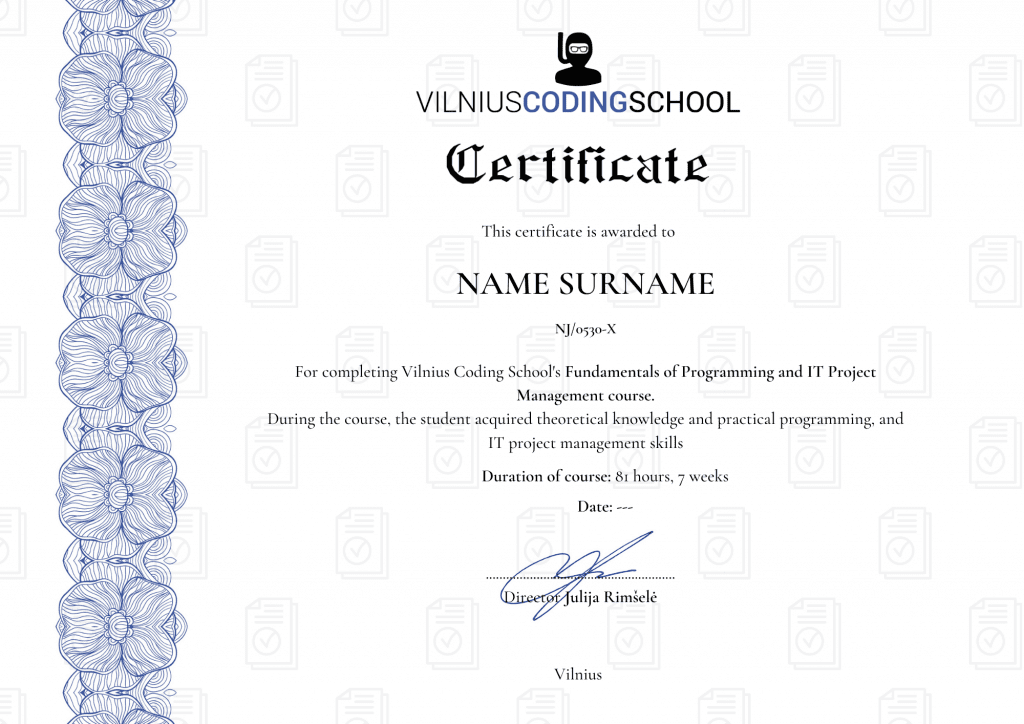Planned training:
May 9
June 13
July 11
August 8
September 12
October 10
November 7
December 12
Price:
2958€
(When paying the full amount, a 10% discount is applied immediately)
![]()
![]()
Python programming courses are designed for those who want to gain a solid programming foundation and learn to use the Python language. These trainings are a great choice for those who want to become Python programmers...
What after training?
After these trainings, students are invited to continue participating in the school's mentoring program free of charge: for a whole month, if questions arise, they can both contact the school's lecturer and use the school's classrooms for independent study.
For our students who want to start a career in the IT field, the Career Center will help them search for an internship or job, provide all the necessary information about job interviews, help them prepare a strong and attractive CV and LinkedIn profile, which will distinguish you from other candidates during the selection process. We constantly share job and internship offers and advise on all issues related to employment. You will not be alone during your job search, our professional team of consultants and mentors will provide comprehensive assistance to achieve your goal of successfully starting a career in the IT field.
Vilnius Coding School cooperates with more than 250 companies - partners that can provide career opportunities for graduates of our school. Even 85 percent everyone who has finished school and applied for a job is successfully employed.
Training program
- Running Python code in the cloud (google colab interface)
- Python programming philosophy.
- How variables are created, their correct name
- Familiarize yourself with dynamic variable setting
- How the type() function works to identify the type of a variable
- Types of numbers, what is the difference between an integer and a real number (float)
- Mathematical operations with numbers
- Creating text variables (string).
- Differences between double and single quotes when creating text variables
- Methods with text variables; slicing a string variable
- Format string syntax with all 4 types of variables;
- Changing variable types.
- Non-primitive variables:
- lists
- tuples
- sets
- Dictionaries
- List variable creation and properties
- List methods:
- Add variable
- Remove a variable
- Modify the list
- List slicing
- Tuple variable creation and properties
- Tuple methods:
- The main differences between tuples and lists are where one applies and where the other applies
- Set variable creation and properties
- Theory of sets
- Set methods
- The main differences between sets and lists are where sets apply
- Creation and properties of the dictonaries variable
- Methods of dictionaries (dictonaries):
- How information is stored in dictionaries
- The main difference between tuples (dictonaries) and other non-primitive variables is where dictionaries apply
- Logical operations with non-primitive variables.
- syntactic theory of the input() function
- examples of application of the input() function
- Converting variables from the input() function.
- Boolean variables:
- IF/ELSE clauses
- Application of the ELIF clause.
- Error management philosophy
- Error handling with try:/except: blocks
- using continue/break when catching errors
- Converting variables from the input() function
- for loop:
- Applying a for loop with list/tuple
- Applying a for loop with dictionaries
- Using continue/break in a for loop
- for loop within another for loop
- Using the for loop with different types of data (string, list and dictionaries).
- while loop syntax:
- Dangers of the while loop syntax - the code will not finish looping
- Using IF/ELSE with a while loop
- Differences in the application of the while loop from the for loop.
- Theory of writing functions
- Functions without return, using only the print() method
- Functions with return syntax
- Functions with list/tuple and dict variables
- Functions with for/while loops
- Writing tests for functions
- assert syntax - lambda function syntax
- Functions in functions
- Recursive function theory
- Function documentation, docstring.
- Philosophy of object-oriented programming
- Object creation, basic methods
- Objects e.g. in popular Python libraries;
- Object documentation
- Object inheritance
- Recommendations for creating objects.
- introduce Python virtual environments
- Pip syntax
- Retaining package versions
- File order in the project
- Generate an .exe file from a python .py script.
- SQL user interface overview and application examples
- SQL lite login on your computer
- Overview of the SQL lite graphical environment
- Entering the words SUM, COUNT UNIQUE.
- Code versioning using GIT and Github
- Core GIT commands
- Code versioning in the cloud - github environment.
- OS Library Overview
- Basic functions for working with files locally
- Google API Library
- Google mail library feature overview
- Google drive library overview
- HTML Basics
- Viewing the code of a web page with a web browser
- request library, core functions and applications
- beautifulsoup4 (bs4) library overview;
- pyQt5 library theory
- pyQT5 widgets overview
- various graphical interface components: buttons, fields to enter data
- pyQt designer overview.
- Preparation of the thesis on the chosen topic
- Final thesis presentation
1. Communication skills
- Active listening
- Effective communication
- Dealing with difficult customers
- Creating a connection
2. Problem solving strategies
- Problem analysis and diagnostics
- Determination of solutions
- Troubleshooting methods
- Root cause analysis of the problem
- Latest problem solving technologies
- How to get feedback from managers
- Professional development
3. Time management and organization
- Prioritization of tasks
- Workload management
- Delegation and collaboration
4. Emotional intelligence
- Understanding and managing emotions
- Empathy and compassion
- Conflict resolution
- Stress management
5. How to learn more and faster and less
to forget
- 5 minute brain exercise
- Clear your "mental fog" with these 5
delicious brain foods - Learn a powerful memory technique to
you would never miss a meeting
- The operation of artificial intelligence. How is it different from a human?
- Creating a request (Prompt). What is the difference between a good query and a bad one?
- Validation of results. Checking the received data for suitability in a specific case.
- Versioning Policy. Identification of the used software (vendor) version in the request.
- Artificial intelligence plugins in the code editor (IDE). Advantages and disadvantages.
- Generating comments using artificial intelligence.
- Creating tests with the help of a plugin.
- Code optimization with the help of a plugin.
Vilnius coding School CERTIFICATE
strong evidence that you are ready career ITEM!

Official certificate approved by the Education and Science Register
Recognized by the strongest Lithuanian and international companies
It proves that you have studied with the best specialists in your field
Reliable proof of acquired skills
Certificate issued by a company developing transparent activities in Lithuania
This certificate confirms that you attended at least 95% of the course lectures in real time with the lecturer, completed and defended the final thesis
Course lecturers
Discount system
Normal cost of training
2958 €
BY PAYING THE FULL AMOUNT IMMEDIATELY
we apply a 10% discount!
€ 2663
(Full price 2958 €)
Applies if you pay the full amount at the time of pre-registration
ALUMNI
we apply a 15% discount!
€ 2515
(Full price
2958 €)
Applies to all school graduates for all training and weekend workshops
RECOMMEND US TO A FRIEND
we apply a 10% discount!
€ 2663
(Full price
2958 €)
Applies if you come to study as a couple








